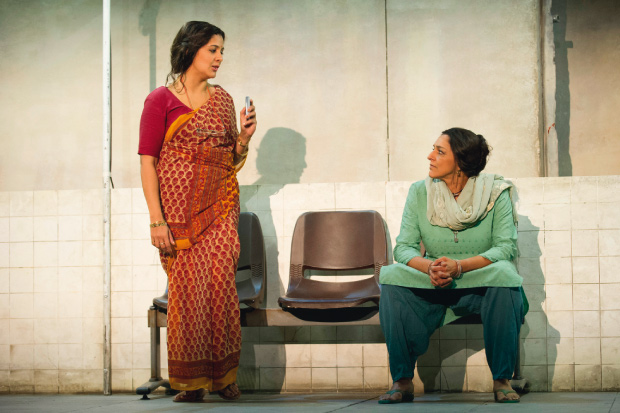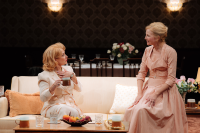Uncle Vanya opens with a puzzle. Is the action set in the early 20th century or right now? The furnishings might be modern purchases or inherited antiques, and the costumes are also styled ambiguously. It soon becomes clear from Conor McPherson’s script, which uses colloquialisms like ‘wanging on’, that this is a contemporary version. It’s always a risk to update Chekhov and the director Ian Rickson pulls it off. Never once did I wonder why these chattering idlers didn’t have broadband or mobile phones.
But the casting is awry. Vanya is a middle-aged Hamlet, a thinker, an observer, whose dreams are smashed to pieces in the course of the action. And because he sees himself as a thwarted romantic and a failed intellectual he needs to suggest some traces of philosophical power and sexual competence. Toby Jones plays him as a crumpled grouch, an articulate but irascible back-biter who hangs around the kitchen table making sarky comments about his shambolic relatives. Who is this sad, lonely prattler? Perhaps a disappointed florist who once reached the semi-finals of Mastermind. Jones is a superb light comedian but he lacks Vanya’s physical swagger and spiritual grace.
The play’s glory lies in the short final sequences, which are beautiful and heartbreaking to watch
Between him and Yelena there isn’t a hint of tension or chemistry. They actually seem quite matey but that’s not right. Sexual frustration is the play’s dominant theme. The entire house ought to pulse and crackle with Vanya’s agonised longings and with Yelena’s monstrous indolence, her titanic uselessness.
The other doomed romance, between Astrov and Sonya, is equally hard to credit because both are dashingly attractive. Why doesn’t the lonely Astrov respond to Sonya’s blatant invitations to kiss her? Is he gay? Sonya is played by the youngest and prettiest member of the cast, Aimee Lou Wood, who has to deliver the line, ‘I’m so ugly.’ No you’re not. You look like Patsy Kensit, aged 20. If Sonya is a beauty, the pathos of her puppy-dog love for Astrov vanishes.
Around the edges of this slightly wonky production are several strong performances. Anna Calder-Marshall’s imperiously melodic voice rings out as a startlingly charismatic Nana. Peter Wight is unobtrusively funny as Telegin. Rosalind Eleazar, as Yelena, the sexy bore, has one of the toughest challenges in the entire theatrical repertoire. Yelena is a helpless contradiction, a vacuum around which everything else orbits. Eleazar captures her sensuous lassitude well enough but she makes one false and revealing move. She rolls her eyes when Astrov delivers his famous deforestation lecture. Why? She genuinely loves him, it’s her only redeeming quality, but if her crush is insincere, she adds mendacity to her catalogue of vices. The press-night crowd seemed to love this version but to me it was a half-full Vanya.
The Welkin opens with a gorgeous tableau. Up come the lights to reveal eight white cubicles, arranged on two storeys, in which solitary women engage in acts of drudgery: cooking, cleaning, child-minding, butter-churning, carpet-beating, and so on. The play is set in the late 18th century and its purpose is correctional. Lucy Kirkwood wants to remind us how badly women of intelligence and talent were mistreated in days of yore. The plot concerns Sally, a rebellious adultress accused of murder, who claims to be ‘quick’ with the local squire’s child. If she’s pregnant, she’ll be shipped off to Australia. If not, she’ll hang. Twelve female jurors must decide if her small abdominal bump is a foetus.
The script is full of man-bashing wisecracks which even us chaps are likely to enjoy. ‘My son was 12lb when he was born,’ says a jurywoman, ‘but we get along quite well now.’ A midwife named Elizabeth (Maxine Peake, quite good) notes that disasters are always ascribed to God ‘when there isn’t a woman to blame instead’. At times the retro-feminism becomes a little absurd. An obstetrician visits the jury room to examine Sally but Elizabeth objects: ‘We do not need a doctor to dictate to us when we are 12 grown women.’ The doctor’s verdict might save Sally’s life but Elizabeth’s priority is her own self-esteem.
Kirkwood has chosen to draw Sally as an exceedingly unsympathetic character, a spiky, foul-mouthed nutcase who doesn’t care if she hangs or not. Were she more charming, intelligent and likeable, the play would reach greater emotional heights. A bit of script editing would help. Act One drags a little and the climax is mishandled. Kirkwood invents a clumsy explosion in a chimney which closes the action with a comic bang. After the interval, the cast reappear with their faces and clothes blackened with soot, like a Tom and Jerry cartoon. But the play’s glory lies in the short final sequences, which are beautiful and heartbreaking to watch. And though the sudden plot twists are shocking they’re also grimly inevitable. Is this play Broadway-bound? Probably.







Comments